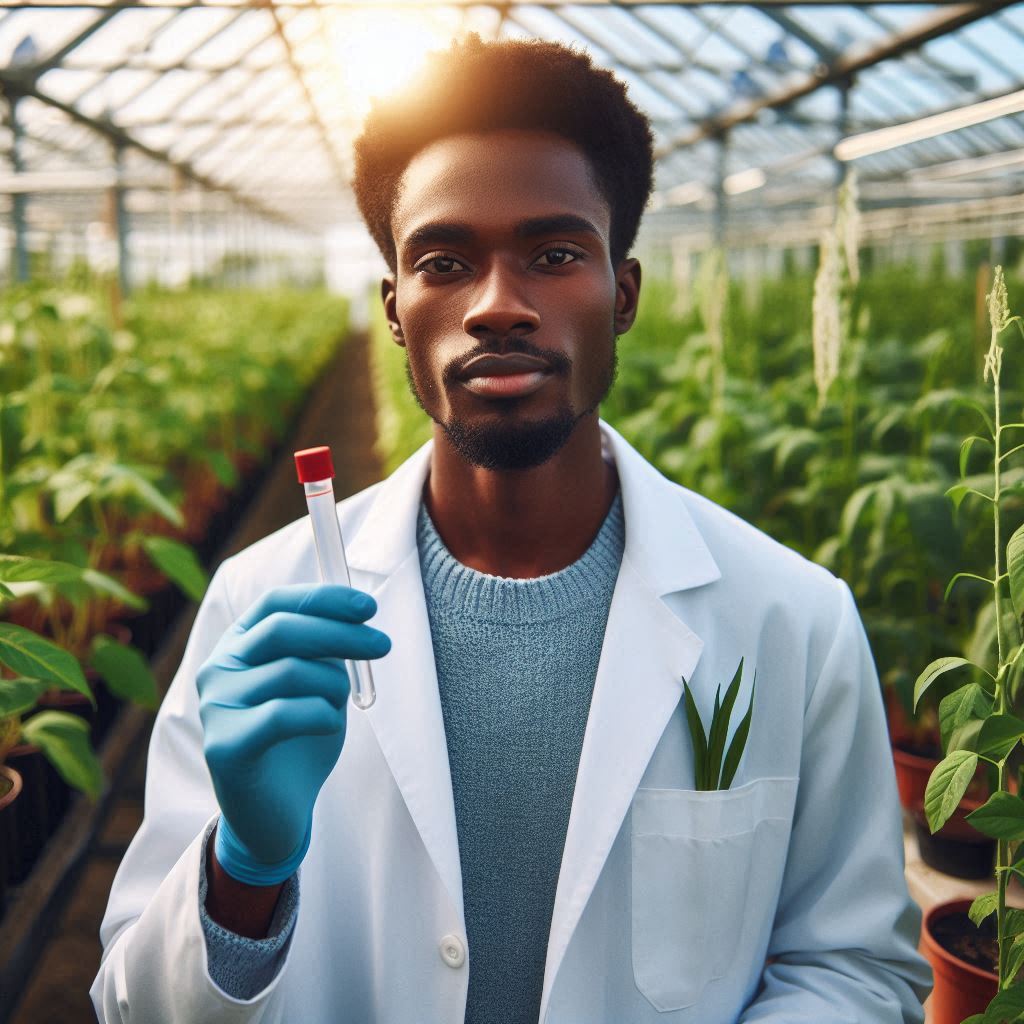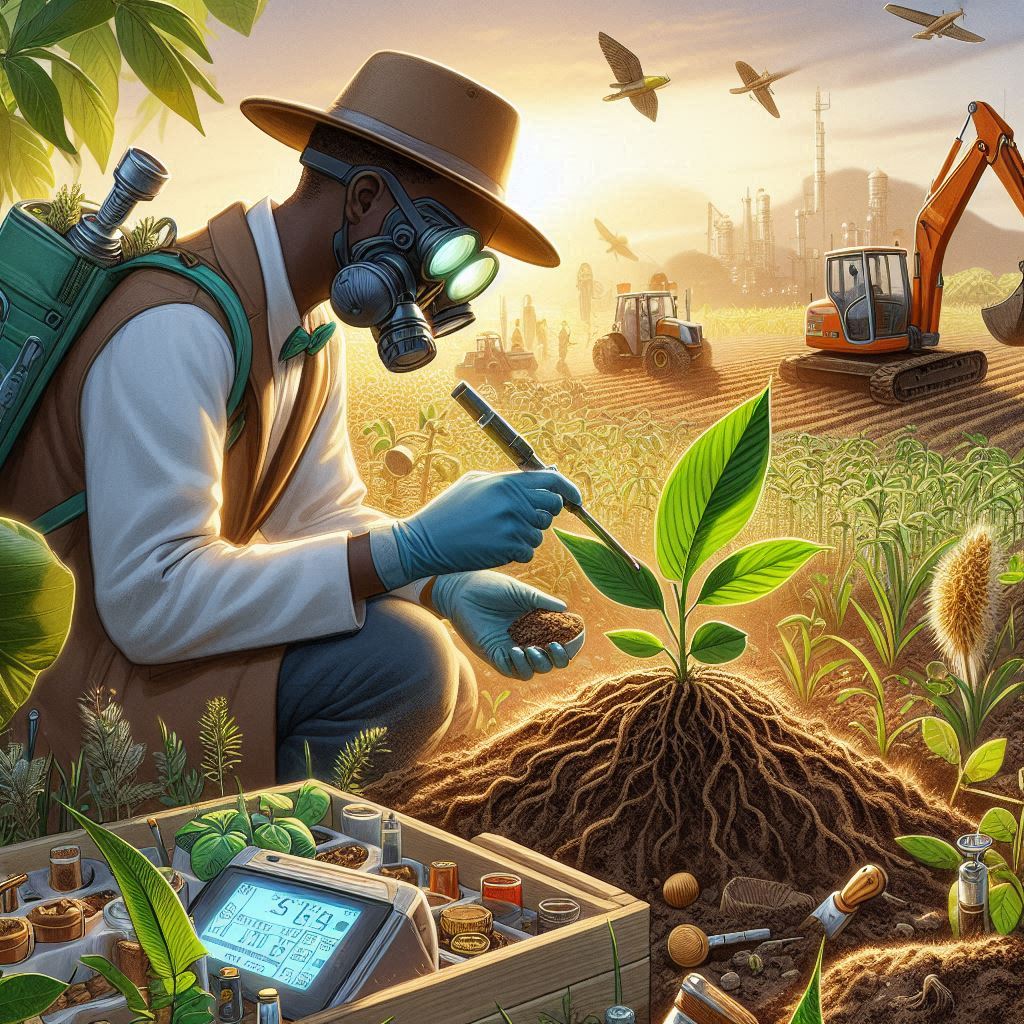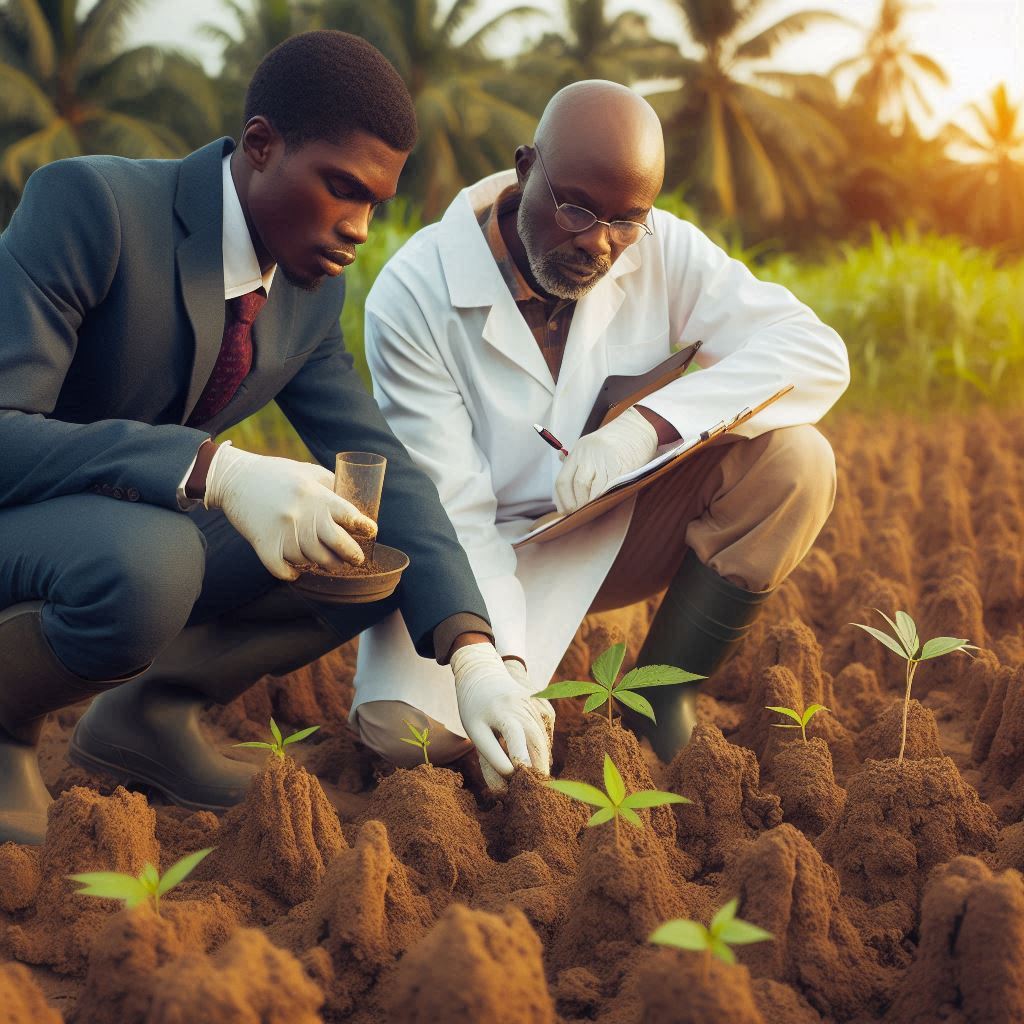Introduction
Agricultural science, encompassing the study of farming techniques, crop cultivation, and livestock management, stands as a cornerstone of societal progress.
Its importance transcends mere sustenance, extending to economic prosperity, environmental stewardship, and social well-being.
In contemporary society, agricultural science plays a multifaceted role, ensuring food security, fostering economic growth, and promoting environmental sustainability.
By leveraging scientific advancements and innovative practices, agricultural science addresses the complex challenges facing humanity, from feeding a growing population to mitigating climate change.
The nexus between agricultural science and sustainable development is profound.
Through practices such as precision agriculture, agroforestry, and organic farming, agricultural science optimizes resource utilization, minimizes environmental impact, and enhances ecosystem resilience.
This blog section aims to delve deeper into the pivotal role of agricultural science in sustainable development.
We will explore its contributions to resilience-building, poverty reduction, and the attainment of the United Nations’ Sustainable Development Goals.
Join us as we unravel the transformative potential of agricultural science in shaping a more sustainable and equitable future for all.
Role of Agricultural Science in Food Security
Agriculture is crucial for feeding the expanding population worldwide.
It provides a sustainable source of food for billions of people.
Through farming practices, a variety of crops can be grown to meet nutritional needs.
Without agriculture, there would be a severe shortage of food supply.
Farmers play a vital role in ensuring that fruits, vegetables, grains are available.
Livestock farming also contributes significantly to the food supply chain.
Role of Agricultural Science in Improving Crop Yield and Quality
Agricultural science plays a key role in enhancing crop yield.
Scientists conduct research to develop new and improved crop varieties.
These varieties are resistant to diseases, pests, and adverse weather conditions.
Genetic engineering techniques are used to create high-yielding crops.
Scientists also study soil and water management techniques to boost productivity.
Modern farming methods such as precision agriculture help optimize crop production.
How Agricultural Science Addresses Food Insecurity Issues
Agricultural science helps in combating food insecurity through various means.
By developing drought-resistant crop varieties, farmers can cope with water scarcity.
Research on sustainable agriculture practices promotes long-term food security.
Integrated pest management techniques reduce crop losses due to pests.
Agricultural science also focuses on improving post-harvest storage and processing methods.
Education and training programs empower farmers to adopt modern agricultural practices.
Basically, the role of agricultural science in sustainable development cannot be overstated.
It is essential for ensuring food security, improving crop yield, and addressing food insecurity challenges.
By investing in research and innovation in agriculture, we can create a more sustainable food system for the future.
Agricultural science plays a crucial role in achieving global food security and sustainable development goals.
Read: Nigerian Educational Technology Associations
Environmental Conservation and Sustainable Agriculture
The Impact of Agriculture on the Environment
Agriculture’s impact on the environment is profound, reaching far beyond the boundaries of farms and fields.
The expansion of agricultural land, intensification of farming practices, and use of agrochemicals have contributed to widespread environmental degradation.
Soil erosion, loss of biodiversity, water pollution from pesticides and fertilizers, and greenhouse gas emissions are some of the key environmental issues associated with conventional agriculture.
How Agricultural Science Promotes Sustainable Farming Practices
Fortunately, agricultural science offers a beacon of hope in addressing these environmental challenges.
By harnessing scientific knowledge and innovation, agricultural scientists develop sustainable farming practices that minimize environmental harm while maximizing productivity.
Techniques such as agroecology, precision agriculture, and organic farming prioritize ecological balance and resource efficiency.
These approaches emphasize soil health, biodiversity conservation, water conservation, and climate resilience.
Through research, extension services, and capacity-building initiatives, agricultural science empowers farmers to adopt practices that protect the environment and ensure the long-term sustainability of agricultural systems.
The Role of Agricultural Science in Conserving Natural Resources
Central to agricultural science’s mission is the conservation of natural resources essential for food production.
Soil, water, air, and biodiversity are the lifeblood of agriculture, and their conservation is paramount.
Agricultural scientists work tirelessly to develop and promote conservation-minded practices that safeguard these resources.
Conservation tillage, cover cropping, crop rotation, and integrated pest management are examples of sustainable agricultural practices that enhance soil fertility, reduce erosion, and minimize the need for chemical inputs.
Additionally, agroforestry systems that integrate trees into agricultural landscapes offer multiple benefits, including soil stabilization, water regulation, carbon sequestration, and biodiversity enhancement.
By advocating for sustainable land management practices, agricultural science plays a critical role in preserving the integrity of ecosystems and ensuring the availability of natural resources for future generations.
Through sustainable agriculture, agricultural science not only ensures the long-term viability of food production but also contributes to broader environmental goals, such as mitigating climate change and preserving biodiversity.
By integrating scientific knowledge with practical applications, agricultural scientists play a crucial role in cultivating harmony between agriculture and nature, ensuring a resilient and sustainable future for generations to come.
Read: Curriculum Studies Scholarships in Nigeria
Economic Development through Agriculture
When it comes to economic development, agriculture plays a crucial role in driving growth and prosperity in countries around the world. Let’s delve into how agriculture contributes to economic growth:
Contribution to GDP
Agriculture is a significant contributor to the gross domestic product (GDP) of many developing nations.
The agricultural sector not only provides food security but also boosts the overall economy through the production and export of crops, livestock, and other agricultural products.
Role of Agricultural Science in Enhancing Productivity
Agricultural science plays a vital role in improving agricultural productivity through research and innovation.
Scientists work to develop new technologies, crop varieties, and farming practices that increase yields and efficiency in farming operations.
By adopting these scientific advancements, farmers can produce more food using fewer resources, leading to higher productivity and increased income.
Creation of Employment Opportunities
Agricultural science plays a key role in creating employment opportunities in rural areas.
By introducing modern farming techniques and technologies, the agricultural sector becomes more efficient and productive, requiring a skilled workforce to implement these innovations.
This, in turn, generates jobs in farming, agribusiness, and related industries, offering livelihood options for people in rural communities.
Essentially, the role of agricultural science in sustainable development cannot be overstated.
By leveraging scientific advancements in agriculture, countries can achieve economic growth, enhance productivity, and create employment opportunities, ultimately leading to a more prosperous and sustainable future for all.
Read: Digital Learning Platforms in Nigeria

Innovation and Technology in Agriculture
Importance of Innovation and Technology in Modern Agriculture
- Innovation and technology play a crucial role in modern agriculture by enhancing productivity, sustainability, and efficiency.
- Advanced farming techniques such as precision agriculture, drones, and genetic engineering help farmers improve yields and minimize environmental impact.
- Innovation in agriculture also leads to the development of new crop varieties that are more resistant to pests, diseases, and harsh weather conditions.
Role of Agricultural Science in Promoting Advanced Farming Techniques
- Agricultural science is at the forefront of research and development in the field of advanced farming techniques.
- Scientists and researchers in agricultural science work on improving and implementing innovative technologies to benefit farmers and the overall agricultural sector.
- Through continuous research and collaboration, agricultural science drives the adoption of efficient and sustainable farming practices.
Agricultural Science’s Contribution to Agricultural Revolution
- Agricultural science has played a significant role in driving the agricultural revolution by introducing innovative solutions to age-old farming challenges.
- The use of modern technologies and scientific advancements has transformed traditional farming methods and revolutionized the agricultural industry.
- By integrating scientific knowledge and research findings, agricultural science continues to drive progress and sustainability in agriculture.
In short, innovation and technology are essential components in modern agriculture, and agricultural science plays a crucial role in promoting their adoption.
Through research, development, and collaboration, agricultural science contributes to sustainable farming practices and drives the agricultural revolution forward.
Embracing innovation and technology is key to achieving sustainable development in the agricultural sector.
Read: Educational Tech Startups in Nigeria
See Related Content: Popular Programming Languages in Nigeria
Addressing Climate Change Through Agriculture
The Impact of Climate Change on Agriculture
Climate change poses significant challenges to agriculture, impacting crop yields, water availability, and ecosystem stability.
Erratic weather patterns, prolonged droughts, and extreme temperatures disrupt traditional farming practices and threaten food security.
Changes in precipitation patterns can lead to water scarcity or excessive flooding, affecting crop growth and livestock management.
Rising temperatures exacerbate pest and disease pressures, further jeopardizing agricultural productivity.
Moreover, climate change increases the frequency and severity of extreme weather events, such as hurricanes, cyclones, and wildfires, causing widespread damage to agricultural infrastructure and livelihoods.
The Role of Agricultural Science in Adapting to and Mitigating Climate Change
Agricultural science plays a pivotal role in adapting to and mitigating the effects of climate change.
Through research and innovation, agricultural scientists develop drought-resistant crop varieties, climate-smart agricultural techniques, and sustainable land management practices.
These advancements enable farmers to cope with changing environmental conditions and maintain productivity in the face of adversity.
Furthermore, agricultural science contributes to climate change mitigation efforts by promoting practices that reduce greenhouse gas emissions, such as agroforestry, organic farming, and conservation tillage.
By integrating climate-resilient strategies into agricultural systems, agricultural science empowers farmers to minimize their environmental footprint and contribute to global efforts to address climate change.
How Agricultural Science Helps in Building Resilience in Farming Practices
Moreover, agricultural science helps build resilience in farming practices by promoting diversified cropping systems, conservation agriculture, and agroforestry.
By integrating trees into agricultural landscapes, farmers can enhance soil fertility, conserve water, and sequester carbon dioxide from the atmosphere.
Conservation agriculture practices, such as minimal tillage and cover cropping, help improve soil structure, reduce erosion, and enhance water infiltration.
Additionally, agroforestry systems that combine trees with crops and livestock offer multiple benefits, including increased biodiversity, improved nutrient cycling, and enhanced climate resilience.
By adopting these climate-smart practices, farmers can mitigate the impacts of climate change and ensure the long-term sustainability of their operations.
The role of agricultural science in addressing climate change extends beyond individual farms to entire agricultural systems.
Through collaborative efforts with policymakers, extension services, and agricultural communities, agricultural scientists facilitate the adoption of climate-resilient practices and promote sustainable development.
By fostering knowledge sharing, capacity building, and technology transfer, agricultural science empowers stakeholders to make informed decisions and implement climate-smart solutions at local, regional, and national levels.
Together, we can harness the power of agricultural science to build a more resilient and sustainable agricultural sector that ensures food security, preserves natural resources, and mitigates the impacts of climate change for present and future generations.
Delve into the Subject: Innovations in Woodwork Technology in Nigerian Schools
Conclusion
In reflecting on the pivotal role of agricultural science in sustainable development, it becomes evident that its contributions extend far beyond mere food production.
Throughout this blog post, we have explored how agricultural science addresses multifaceted challenges, ranging from environmental conservation to poverty alleviation and economic empowerment.
By promoting sustainable farming practices, enhancing productivity, and fostering resilience in agricultural systems, agricultural science serves as a catalyst for positive change.
Its innovative solutions not only ensure food security for present and future generations but also contribute to the attainment of broader development goals, such as poverty reduction, gender equality, and climate resilience.
As we navigate the complexities of the 21st century, the importance of agricultural science in achieving sustainable development cannot be overstated.
It is imperative that we recognize and prioritize the role of agricultural science in shaping a more equitable, resilient, and prosperous future for all.
Therefore, it is incumbent upon policymakers, researchers, practitioners, and stakeholders across sectors to promote and support agricultural science initiatives.
By investing in research, education, and technology transfer, we can harness the full potential of agricultural science to address global challenges and create lasting positive impact.
Let us unite in our commitment to advancing agricultural science for sustainable development.
Together, we can build a future where agriculture not only sustains livelihoods and ecosystems but also fosters inclusive growth and prosperity for all.




